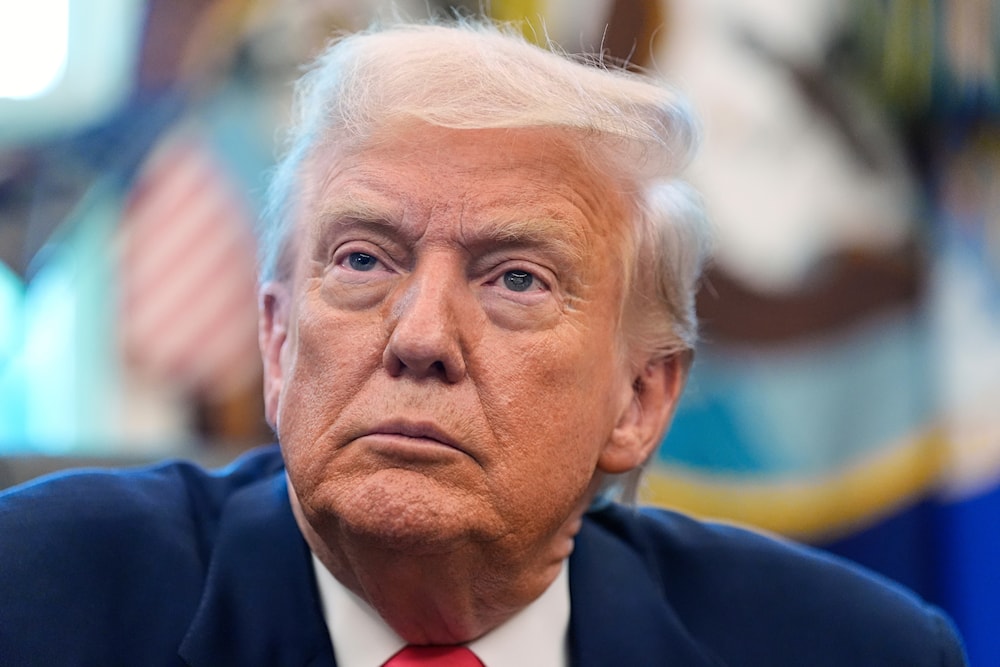Trump sidesteps Senate in US attorney appointments
US President Donald Trump is sidestepping Senate confirmation and judicial oversight to appoint loyalists as US attorneys, exploiting vacancy laws and sparking criticism over politicizing federal prosecutions.
-

President Donald Trump listens during an event in the Oval Office to mark the 90th anniversary of the Social Security Act, on August 14, 2025, in Washington. (AP Photo/Alex Brandon)
Across the US, President Donald Trump has repeatedly bypassed the Senate to install his preferred US attorneys, using legal loopholes that extend temporary appointments and sidestep judicial oversight.
A Politico report published on Tuesday details that in districts including Los Angeles, Nevada, New Jersey, New Mexico, and upstate New York, the administration has overridden or preempted Senate confirmation and even district judges’ authority to appoint replacements once interim terms expired.
By cycling nominees through "interim" and "acting" designations, Trump’s Justice Department has been able to keep loyalists in office for months, and in some cases nearly a year, without Senate confirmation.
Legal scholars note that while the law does not explicitly forbid this maneuvering, it was never intended to allow presidents to avoid Senate vetting, according to the report.
"The intent [of the law] was always for Senate confirmation," said Jennifer Selin, a law professor at Arizona State University.
According to Politico, federal law allows interim US attorneys to serve for 120 days, but if no Senate confirmation follows, district judges may appoint a successor indefinitely. Trump’s administration has sidestepped this by reappointing its choices as "acting" US attorneys, granting them an additional 210 days.
In two cases, the administration preempted judicial votes entirely by converting interim officials into acting US attorneys before judges could act. In at least one district, these tactics are being challenged in court as unconstitutional.
Controversial cases in key states
The report mentions that the most contentious fight unfolded in New Jersey, where Trump appointed Alina Habba, a former personal attorney and loyalist, as interim US attorney. Lacking prosecutorial experience, Habba nonetheless opened several politically charged cases against Democratic officials.
When judges voted to replace her with longtime prosecutor Desiree Leigh Grace, Trump’s Justice Department fired Grace and reinstalled Habba as "acting" US attorney, adding that the move is now being challenged in court.
Similar scenarios have emerged elsewhere. In northern New York, Trump’s choice, John Sarcone III, was rejected by judges but brought back under a “special attorney” designation. In New Mexico, Ryan Ellison was converted to "acting" US attorney after judges declined to extend his appointment, allowing him to serve nearly a year without Senate confirmation.
In Los Angeles, Trump’s appointee Bill Essayli faced criticism for allegedly pressuring prosecutors to pursue politically driven cases. When his interim term ended, he was reclassified as “acting” US attorney.
In Nevada, Trump’s pick Sigal Chattah remained in office despite opposition from more than 100 retired judges who objected to her inflammatory public statements, and the administration sidestepped a judicial vote by converting her status to “acting.”
While the tactic secures Trump’s loyalists in key prosecutorial roles for now, legal experts say it may undermine the effectiveness of US attorneys in court. Retired US District Judge John S. Martin cautioned that appointees installed over judicial objections risk losing credibility before the bench, potentially weakening the government’s cases.

 3 Min Read
3 Min Read










